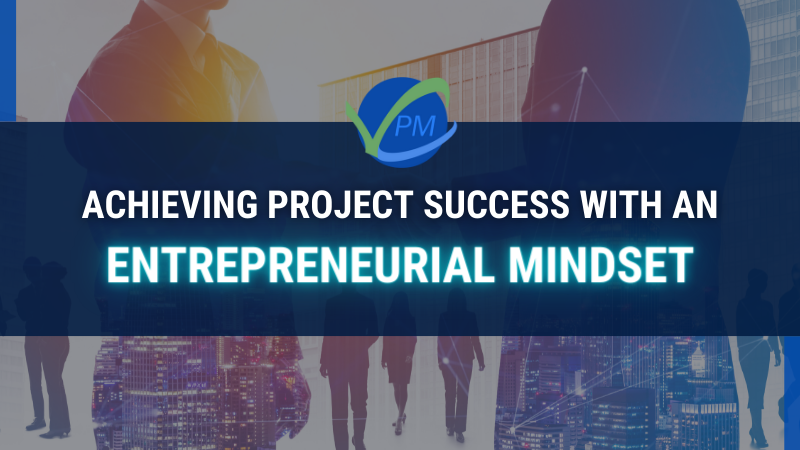
by DharamCW | Jun 12, 2022 | General
Two relevant quotes which quickly strike our minds when we think about the Entrepreneurial mindset are:
“Building a business is not rocket science; it’s about having a great idea and seeing it through with integrity.” Richard Branson
“At 211 degrees, water is hot. At 212 degrees, it boils. And with boiling water comes steam. And with steam, you can power a train.” S.L. Parker
Ideally, a project’s success is based on the critical success factors identified during the initial stages of the project, which would fall in various areas such as Process, Product, Project Management, Business, and Strategic. When the project can make a positive and long-standing impact on business value, a culture deeply imbibes into people’s minds. It creates an undeniable mark in the overall scheme of things.
Benefits and stakeholders’ satisfaction are the key factors that measure a project’s success. It’s also defined by the level of efficiency the project creates based on the set project objectives. Project success is based on the project success criteria and outcome. Typically, these criteria fall as Meeting the Scope identified, Deadlines and Milestones on time, Within the given budget, excellent satisfaction to the stakeholders, both internal and external, and with specified quality criteria.
Essentially, we all know that various tenets of project management contribute to success. Here, we will discuss how the entrepreneurial mindset would impact project success. Entrepreneurs have some unique characteristics such as being adaptive, decisive, risk-tolerant, persistent, able to handle failure, experimenting, building teams, etc.,
Mindset
One must believe that we can be malleable to unlock our growth as project managers or portfolio managers by transforming into an entrepreneurial mindset. We need to understand what mindset is, then understand the characteristics of an entrepreneurial mindset and how we can embark on that transformation journey from where we are to bring on project success in our project management career.
Mindset is an essential set of beliefs that provides a shape in terms of the view one has on the world and themselves. It influences how we think, act, feel and respond to a given situation. Typically, mindset falls into two categories as introduced by Carol S. Dweck, which we are all aware of: they are a) Fixed Mindset and b) Growth Mindset.
An entrepreneurial mindset is a growth mindset. Intelligence cannot be developed with a fixed mindset. A growth mindset is all about the belief that intelligence can be developed through personal effort, good learning strategies, and lots of mentoring and support from others. As introduced by Heider, the interpersonal process equation is a product of Ability, Motivation, and Environment.
An entrepreneurial mindset is a set of skills that allows people to recognize and capitalize on opportunities, overcome and learn from setbacks, and succeed amidst challenging backdrops. An entrepreneurial mentality is a method of thinking that helps achieve your business objectives. Entrepreneurs who learn from their mistakes and failures have a better chance of future success.
Entrepreneurs boost the economy by creating jobs and developing new products and services that benefit the entire world. A great entrepreneur must be able to think outside the box and come up with out-of-this-world ideas.
Entrepreneurial mindset and project management
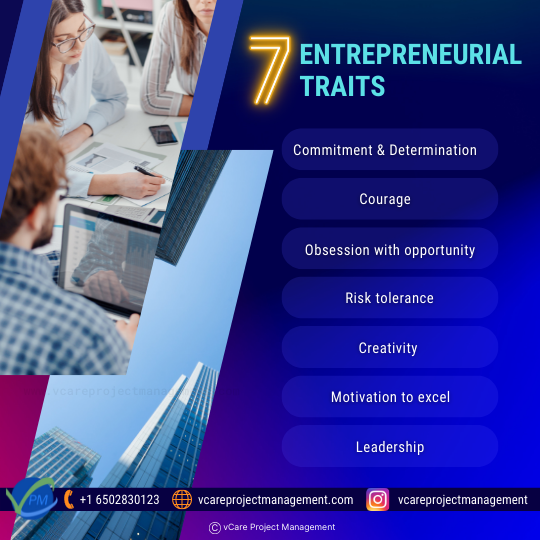
7 Entrepreneurial Traits
Though there is a common belief that entrepreneurship cannot be taught, and they should be born, studies have proven that it’s a myth. Typically, entrepreneurs search, seize and exploit the opportunities while mitigating them through engagement, courage, and perseverance. The following are the entrepreneurial traits that are generally encompassed in an entrepreneur:
- Commitment and Determination
- Courage
- Obsession with opportunity
- Risk tolerance
- Creativity
- Motivation to excel
- Leadership
An entrepreneurial mindset fosters more value for projects. Your project teams are encouraged to solve business problems and develop creative and innovative ideas. When a leader allows the teams to be creative and innovative, they will be more productive and engaged in the project.
The journal “People’s confidence in innovation” indicates that confidence in innovation is a component of the entrepreneurial mindset. In several ways, confidence in innovation can be considered part of the entrepreneurial mindset.
- First, entrepreneurs have more confidence in innovation than non-entrepreneurs.
- Second, confidence in innovation is positively related to other aspects of the entrepreneurial mindset, most notably self-efficacy, opportunity alertness, risk propensity, and role-modelling.
- Third, according to (Nochian and Schtt’s 2012) study, entrepreneurs are not like other people. Instead, their network appears to be the source of their confidence. In the same way, highly networked owners or managers are highly confident in innovation.
- Fourth, their innovativeness appears to be a result of their confidence. The more confident entrepreneurs are, the more innovative they are.
Entrepreneurial mindset and Project success
Commitment & Determination
Commitment and Determination would encompass Decisiveness, Tenacity, Discipline, persistence in solving problems, willingness to sacrifice, and being completely immersed in the mission. In the context of project management, each of these characteristics would contribute to the project’s success. For example, it is being decisive in terms of critical path challenges and exhibiting tenacity for unblocking issues without giving excuses for the need of the project and solving problems. Being committed requires a lot of sacrifice and discipline to bring on consistency. When being disciplined, it would require more like a parenting skill which would always course correct in the larger interest of the project, though seen to be tough externally. Discipline is brought about by establishing an unalterable set of rules and regulations to follow for the project’s success.
Courage
The definition of courage is “mental or moral strength to venture, persevere, and withstand danger, fear, or difficulty” (Mish, 1994, 266). Courage could be implemented with excellent values through moral strength, fearless experimentation, unafraid of conflicts, no fear of failure, and intense curiosity amidst facing risk. A courageous project manager would tackle the controversies and conflicts in the project early. A fearless project manager could put his job on the line in the pursuit of doing The Right Thing for the project. Often, the project manager would not have the necessary support and face active resistance, which needs to be managed with resolve to move beyond personal discomfort through intense curiosity.
Obsession about opportunity
An entrepreneur constantly looks for opportunities for improvement. Similarly, project managers consistently look for opportunities for improvement daily by observing day-to-day activities seeking to do more, do better, and do differently. Obsession with opportunity would be recurring, which would preoccupy or intrude on the project manager’s mind. This obsession would naturally shape the opportunity and help focus on project needs. Obsession with opportunities drives business value through the project.
Risk Tolerance
Good project managers would tolerate risk while being calculated risk-taker and risk sharers, thereby minimizing the risks. He would exhibit the characteristic of an entrepreneur by showing the ability to manage stress/conflict and ambiguity. Especially when the project has larger integrations and frequent changes would increase the ambiguity and uncertainty proportionally. Generally, the unknowns which are in the project would cause ambiguity. The ability to understand those would help identify the risks involved. PMBOK defines these areas in terms of Risk tolerance, Risk appetite, and risk threshold. It guides the management of these effectively through appropriate processes involving planning, controlling, and appropriate level of communication.
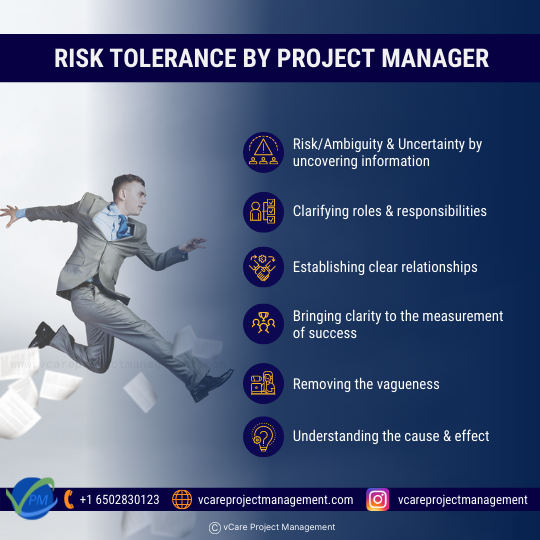
Risk Tolerance
Project managers should learn how to maneuver ambiguity. As ambiguity would be sinusoidal over time, it would arise and settle. The project manager must manage risk/ambiguity and uncertainty by uncovering information, clarifying roles and responsibilities, establishing clear relationships, bringing clarity to the measurement of success, removing the vagueness, and understanding the cause and effect.
Creativity
So what is creativity? In “The Social Psychology of Creativity,” Amabile (1983) defines creativity as,
“A product or response will be judged as creative to the extent that (a) it is both a novel and appropriate, useful, correct or valuable response to the task at hand, and (b) the task is heuristic rather than algorithmic” (p. 33).
Creativity can be multiple things. It would always push your limits by being open-minded, lateral thinking, ability to conceptualize by going into details, and ability to adapt. Creativity can be unleashed in project setup during Brainstorming sessions, Root Cause Analysis, Force field analysis, Affinity Diagrams, SWOT Analysis, etc. Creativity can be fostered further by open communication and providing an environment for the resources involved. As a project manager, one needs to remove the mental blocks like “Always looking for the right answer,” “avoiding ambiguity,” “I’m not creative,” “Always looking for concrete answers,” and “That’s not my area,” etc., Encourage creative aspects through “Why not like that,” “Let’s explore more,” “what value it would bring in,” etc.,
Motivation to excel
There is a popular phrase. Projects don’t succeed; people do. Typically the project’s success is always attributed to the people. People tend to have a goal and result orientation and need a self-imposed drive to achieve the results. Typically entrepreneurs keep motivating themselves and others around them despite all odds. People involved in projects need interpersonal support, understanding of weaknesses, and guidance to overcome them. Essentially aspects like having a sense of humor and perspective on the value they are adding to the project would motivate them to do better. The project manager’s responsibility is to understand individuals and adopt appropriate motivations strategy based on their needs, desires, and goals. They reward the team and its members creatively by recognizing their strengths. Make the project goals and success factors visible to the entire team. They are clarifying how the performance will be validated as an exact measure.
Leadership
Leadership is one of the essential traits entrepreneurs have. They would be self-starters and have a strong internal locus of control. Locus of control is the degree to which people believe that they, as opposed to external forces (beyond their influence), have control over the outcome of events in their lives. The concept was developed by Julian B. Rotter in 1954 and has since become an aspect of personality psychology. Project managers with an Internal Locus of Control believe that every event in their life derives from factors under their control. These individuals tend to blame or praise themselves for whatever success or failure they experiment in life. They would have enormous patience, integrity, and reliability. They would build teams and more leaders. Key attributes of communicating with a project management mindset include empathy, clarity, authenticity, and flexibility.
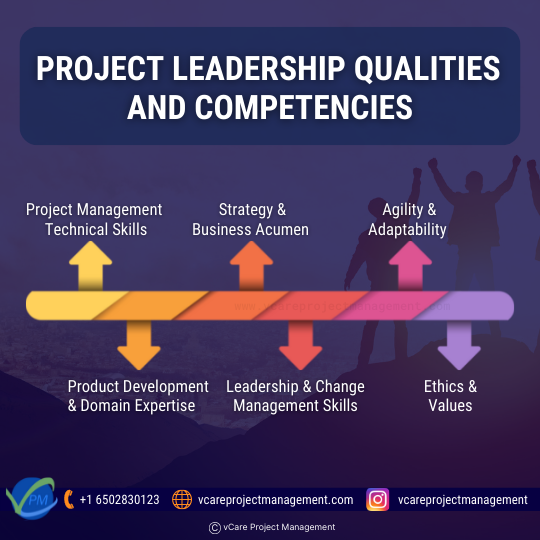
Project leadership qualities and competencies
Successful projects come as an outcome of a well-coordinated team effort. Project managers as leaders know their team very well.
The entrepreneurial mindset’s key aspects of a project’s success
Being confident and open-minded is crucial for a project professional with an entrepreneurial mindset. It’s about being self-assured, optimistic, and never afraid to take risks. Every day, if you have an entrepreneurial mindset, you will be ready to take action to achieve your goals and acquire project success.
While some scholars have examined aspects of the entrepreneurial mindset and provided general insights into its attributes, qualities, and operations, the question remains how people tap into it.
- The cognitive aspect—how do entrepreneurs use mental models to think?
- The behavioral aspect—how do entrepreneurs engage or act for opportunities?
- The emotional aspects—what do entrepreneurs feel in entrepreneurship?
Project leadership qualities and competencies
When the project requires success, both project managers and project sponsors should take up the role of a project leader by demonstrating leadership talents, competencies, and entrepreneurial mindsets. The following are the most significant features of effective project management:
- Project management technical skills
- Product development and domain expertise
- Strategy and business acumen
- Leadership and change management skills
- Agility and adaptability
- Ethics and values
Conclusion
The entrepreneurial mindset is an important factor leading to project success. Many leading authors agree with this point of view and are researching to substantiate this grounded theory. This endeavor to bring out the factors associated with the project manager’s leadership style profoundly impacts project success.
Feel free to check out my discussion on this topic with Thomas Walenta in YouTube
You can subscribe and follow my podcasts and interviews with Project Management Experts on YouTube at https://bit.ly/2NDY8wd
You can subscribe to vCare Project Management YouTube Channel to catch future videos of our certification Q&A series and student success stories using the link https://bit.ly/2YF0wJl
For any questions related to Project Management career, training, and certifications, you can book an obligation free 15 minutes session with me by visiting talktodharam.com
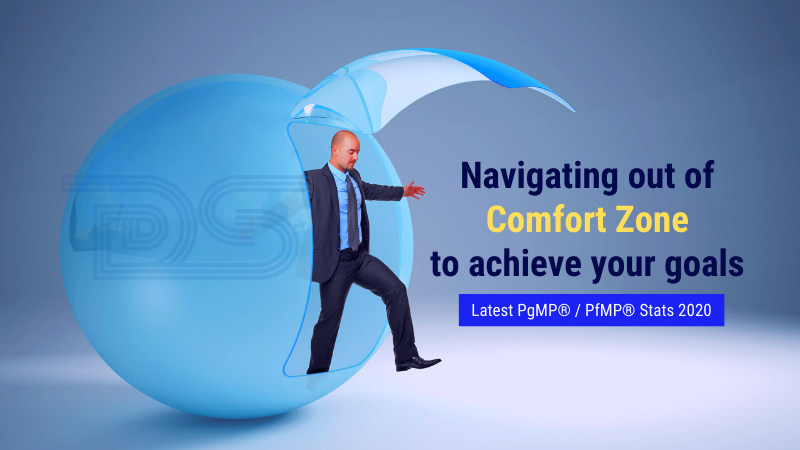
by DharamCW | Sep 19, 2020 | General
The term “Comfort Zone” has been put to use in professional citations since the 1991 work “Danger in the comfort zone”. It became widely popular after the paper “From Comfort Zone to Performance Management” by Alasdair White in 2008. “Comfort zone” is to be understood as a behavioral state from which an individual operates or works or carries on his way of life. Comfort zone is almost unique to everyone, and it may or may not be equivalent to another individual.
In our life, we do come out of our comfort zones many times, though we rarely recognize it. Your first day at school, moving from school to college, college to your first job, making your next big career move, etc. could be stated as examples.
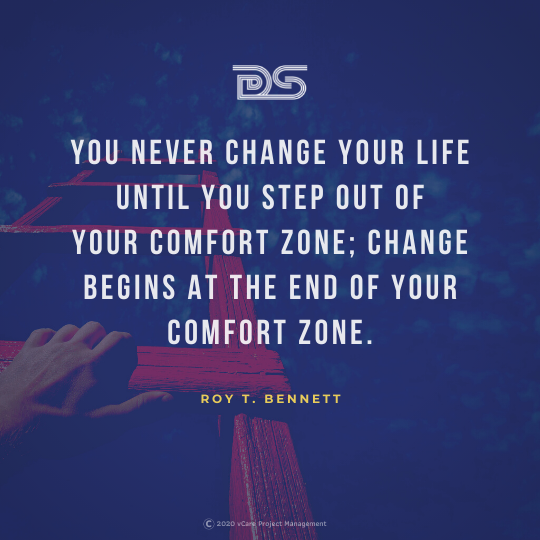
Comfort Zone
At these points in time, we would have experienced a lot of pressure to adapt, expand our skills and continue to learn and evolve. Our inner ego would have pushed us to get out of being labelled as incompetent, inauthentic or an imposter and succeed in the new role assigned to us by time.
It’s also critical to understand first the opportunities this journey out of your comfort zone would reward you. Here we discuss some ways using which we can navigate ourselves out of our comfort zones to achieve success.
Indicators of you being in a comfort zone
Let’s take a case where you have been working as a manager in a reputed organization, handling specific operations, and you are awesome at what you do. If you have specific career goals, and you have identified your destination, you need to understand whether you are currently in a comfort zone first.
Some indicators could be,
- You are doing your job with ease and make consistent paychecks
- You don’t have anybody to benchmark within the organization or the industry forum
- You are pretty much self-sustained, and you don’t see yourself any scope for further growth
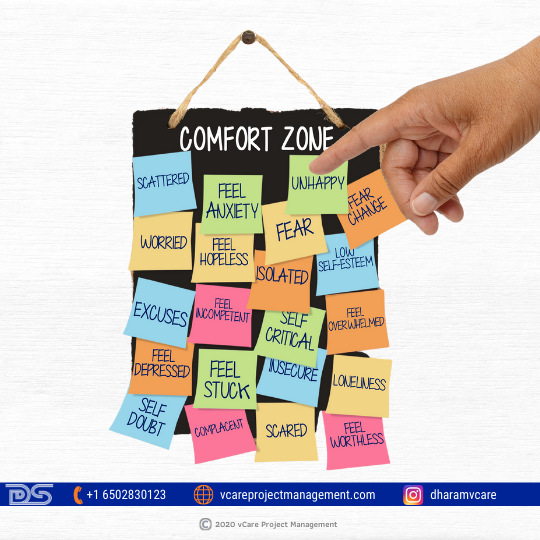
Being in a comfort zone
Comfort zone Assessment Questions
Here are some questions which can help you understand if you are already in the comfort zone.
- When was the last time you were very stressed in making some decisions at work?
- When did you last take up a new challenge?
- When did you do something creative and new?
- Are you happy with what you are doing?
- Are you sure that you are not lost nor out of control?
Why do we need to move out of the Comfort Zone?
When we are in the comfort zone, we don’t learn; we don’t evolve. Learning gets halted, and we fail to embrace new ideas and concepts. We stop experiencing newer things in life, and this might result in loss of acquiring critical behavior or skills. We naturally become the victim of behavior patterns which we are used to as the time spent on comfort zone becomes longer.
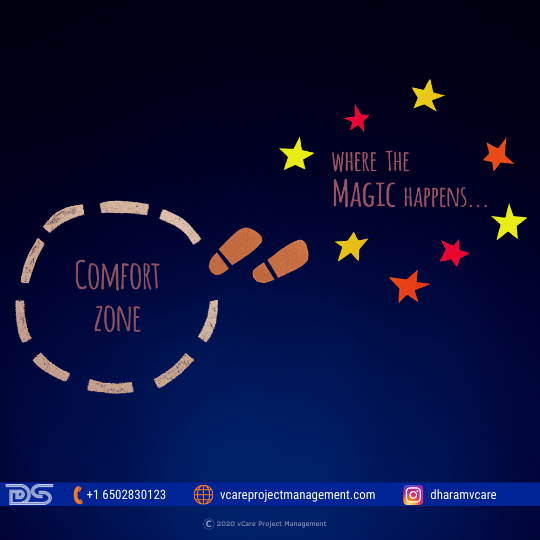
Why do we need to move out of the Comfort Zone?
Gone are the days where living in such a context is not a life challenging issue for an individual. Times have changed, and in today’s professional world, only those who embrace continuous learning and adaptability are better poised to succeed.
Understanding the Fear zone
For any individual contributor of a team, the moment you feel that you have the capability coupled with an excellent opportunity to be part of leadership or management, your journey out of your comfort zone has begun.
When you think about doing something new, you naturally get fear, or you feel terrified. When this thing happens, most of us cloak ourselves with any of these following excuses:
- Yeah, I’m doing what I know very well, and there is nothing wrong about it.
- Why do we need to change the status when everything is going fine today?
- Having a false impression that you have future proof skills because you are thriving today.
- I have maneuvered myself this far, why do I need to propel my limits further.
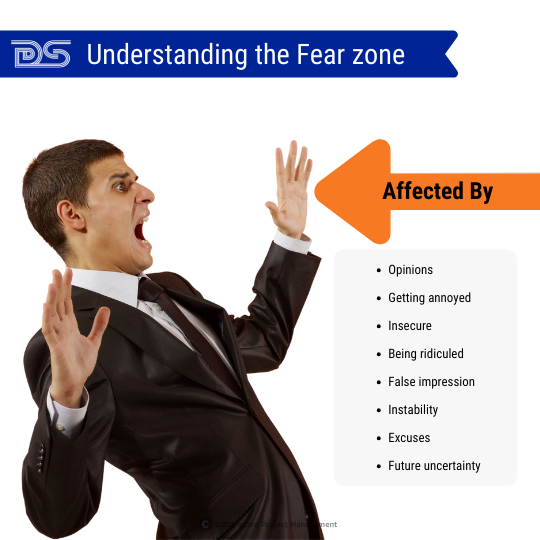
Understanding the Fear zone
When we are in the fear zone, we also tend to be affected by other opinions and get annoyed. Typically, in projects, some people can be identified in a peculiar way wherein they will not share any information due to insecurity or fear. They always worry about what is going to happen.
These are individuals who build a shell around themselves thinking what will others think If I ask this question, maybe people will laugh at me, ridicule me, etc. These are good signs indicating you are in the fear zone.
What is needed to come out of the fear zone?
- Courage
- Compassion
- Wisdom
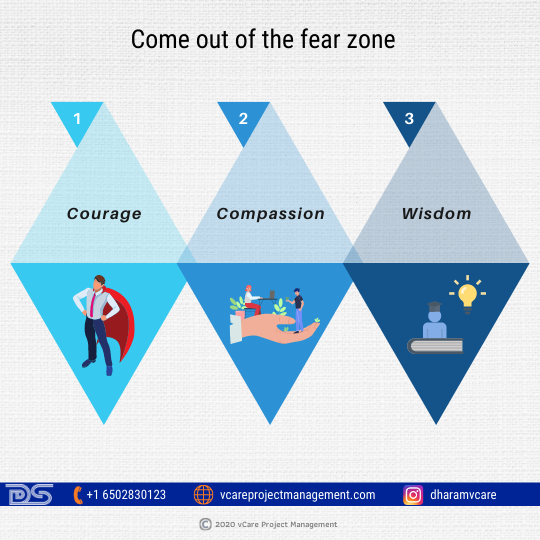
Come out of the fear zone
Have the courage to understand and look situation like “You are not alone” in this. Look at the situations more positively. Consume information which is more reliable and that which will lead you the right direction. Trust yourself first, and also others around you. Get around with people who are your well-wishers and find them within the project organization. Discuss your fears openly with them take baby steps to come out of it. Believe that when you confront your fears, you will also be able to help others confront the fear and manage it better for the overall good of the organization. It might take longer than you think to come out of it, but it is alright. You will be able to maneuver out of the fear zone and move towards reaching your full potential by getting transformed at the Learning Zone.
Most individuals tend to get stuck in this zone or go back to their comfort zone. You must stay in the course of advancing into the subsequent zone. The journey is more rewarding than the end goal of getting beyond the growth zone. Now let’s look at the learning zone.
Learning Zone: Knowing vs Doing Gap
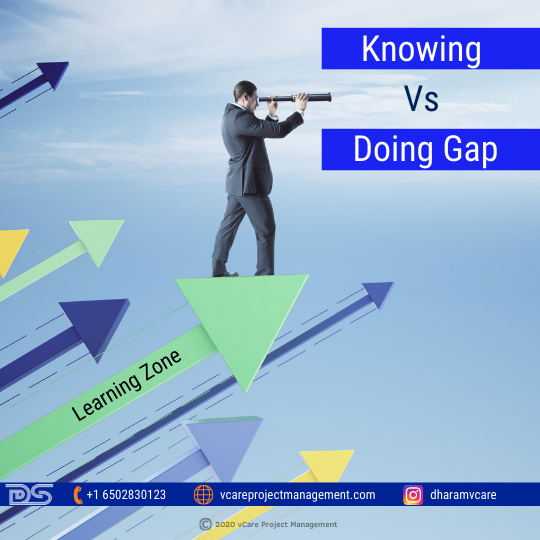
Learning Zone
You are managing a project in India; you have a multi-cultural and a multi-lingual environment. Such a context could position you to get out of the comfort zone to interact, manage these stakeholders.
You, an expert in process manufacturing, is assigned to work on a new project where you are dealing with discrete manufacturing. Here you will have the pressure of handling something new which you haven’t done before.
Given these kinds of situations, project managers tend to look at various resources in terms of books, YouTube videos, courses and prepare themselves. Yet, they will have the anxiety as there is a Knowing-Doing gap. In this case, the learning ought to get transformed as behavior.
Dr Andy Molinsky is a professor at Brandeis University’s International Business School and author of “Reach: A New Strategy to Help You Step Outside Your Comfort Zone, Rise to the Challenge and Build Confidence” recommends 3Cs for the same they are:
- Conviction
- Customization
- Clarity
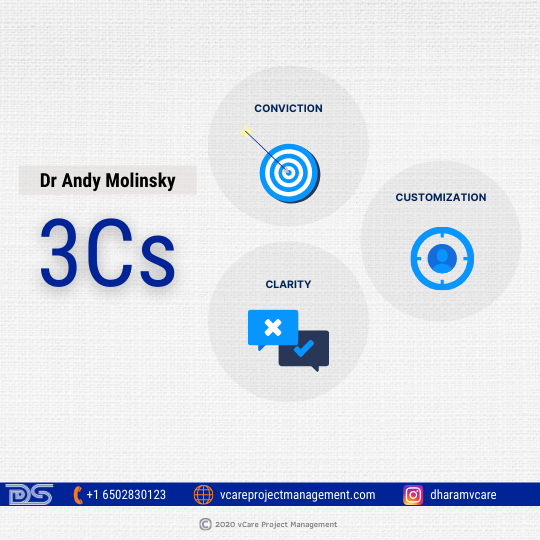
3Cs
Conviction is more towards understanding the deep sense of purpose which can come from the activities which can help your self-esteem or when you have the intent of helping or enabling others. For example, you have a challenge in your project to work on a Gantt Chart, which is essential to be presented to the management. You find that no one else in the team knows about it. Now you need to have the conviction to build it yourself first time as you want to enable the team to help them understand the project situation better. That intent helps you to get you the transformation required. This way, you have responded to the challenge, and also acquired a new skill in the process.
Customization is more of tweaking the solution in your way. Every project organization or PMOs could be different. What worked in your previous office might not work here, as people have cultural and behavior differences. You must customize the data, context, terminology, presentation to their needs by taking steps completely new compared to what you have done in the past. Being adaptive is the most beautiful thing people always admire.
Clarity serves the situation where it is very distorted and chaos. Especially in Project/Program/Portfolio management, where pressing priorities of activities create a nightmare for the managers and resources become contentious. Step away for a short while to take stock of the situation, put yourselves in other person shoes, Self-reflect upon the situation in the right context. Many times, reaching out to a coach or mentor would help in the situation.
Keep building your resilience by doing good things which you are not comfortable. Some simple examples could be Saying “Hello” to strangers, ordering food other than your routine. These acts could increase your will power and mental attitude. By doing these, you can make learning zone your comfort zone and start advancing into the growth zone. Consistently focusing on moving out of the comfort zone is the key.
Growth Zone
Instead of thinking “What if I’m not good enough?”, thinking more like “What if I’m good enough and moving towards success?” would help to be in the growth zone.
Instead of worrying and being stranded at the learning zone, identify the gap in terms of training, upskilling needs, mentoring, coaching needs that navigate towards your objectives. For example, if you are lacking in risk management or project management and need guidance, reach out to the right consultants or coaches or mentors who can help you succeed.
Eradicate the habitual negative thinking and internal fears. With the help of knowledge that you acquired in your learning zone; you should be able to manage things in the growth zone easily. Always ask “What’s the best, most productive action I can take to get the best possible outcome given the situation?”. Change your environment to be positive, have positivity anchors and use visualization techniques. By changing the internal representation of the problem, your ability to recover from that is increased manifold. As a project manager, there are a lot of dependencies and constraints you ought to manage; these dependencies and constraints need to be overcome to eliminate the fear of failure.
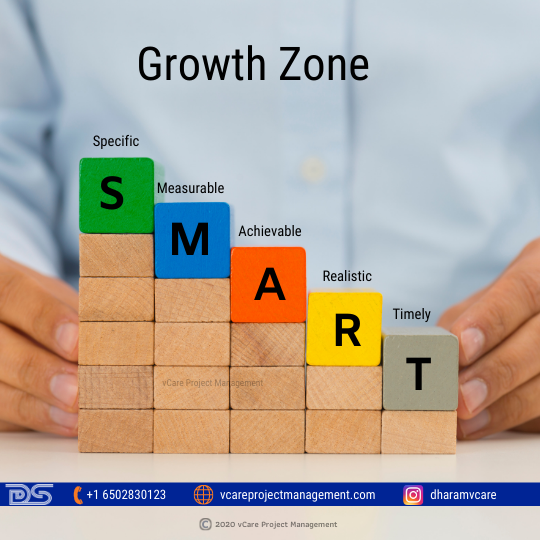
Growth Zone
Typically, negative experiences are what creates fear within. If you believe and value whatever you are doing, you will find a way. You will begin to see them as challenges as opposed to problems or obstacles. Make your goals SMART and start recording your smaller achievements in a book which you can use to track and repeatedly revisit to gain motivation. By eliminating needless fears and factors that hamper your progress, you can break out and live a life beyond limits!
PgMP® / PfMP® certifications
For most senior professionals in the project-program-portfolio management community, there has been no bigger phobia than the PgMP® / PfMP® certification exams. Over the past few years, an aura of unconquerability has been associated surrounding these certifications, but nothing can be far from the actual truth. With proper guidance supported by a well laid out action plan, followed by commitment and hard work, these certifications are achievable, and many of my students are witnesses to the fact. Let us look at the recent stats, concerning these two certifications to understand how exactly this community has managed to thrive irrespective of the current context.
Between 1st July 2020 and 1st Sept 2020, 60 professionals successfully attained their PgMP®, of which 12 are my students. Congratulations to all 60 of them for continuing to have the inner drive to succeed in these tough times.
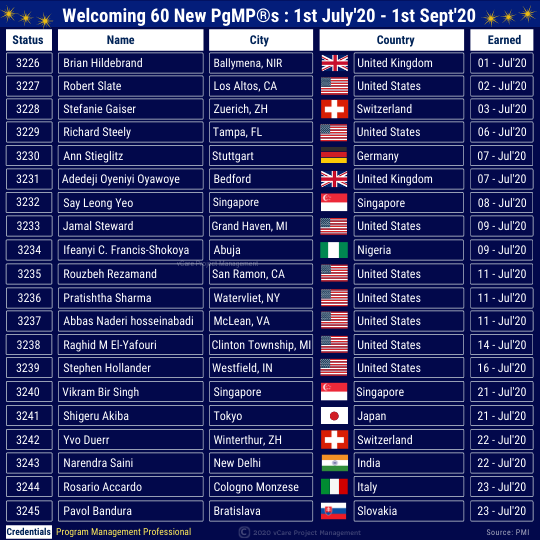
Welcoming 60 New PgMP®s
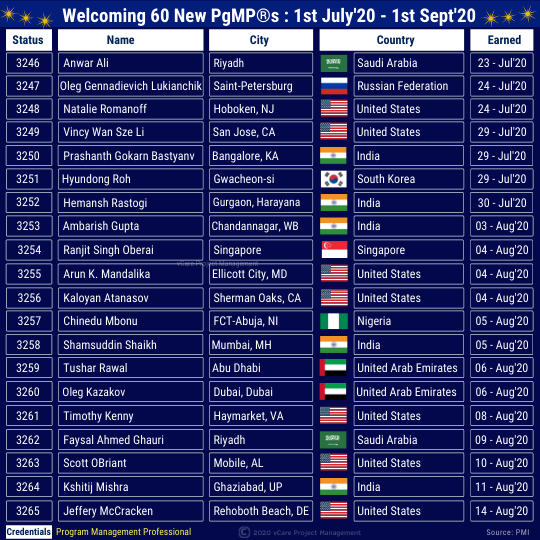
Welcoming 60 New PgMP®s
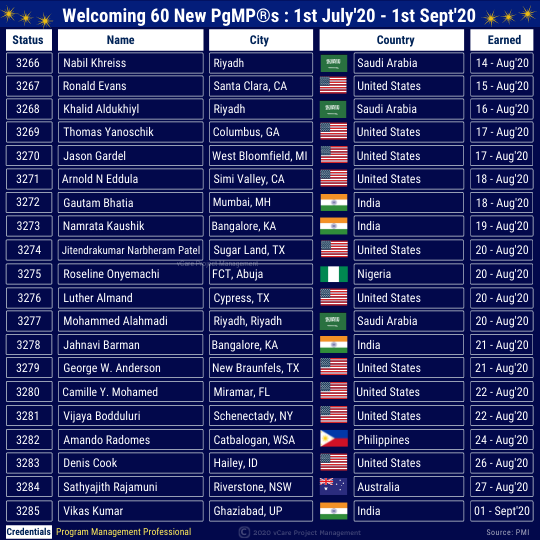
Welcoming 60 New PgMP®s
Regarding PgMP®, as on 1st Sept 2020, vCare has contributed to the success of 289 global PgMP®s (out of 3,286) from 43 countries.
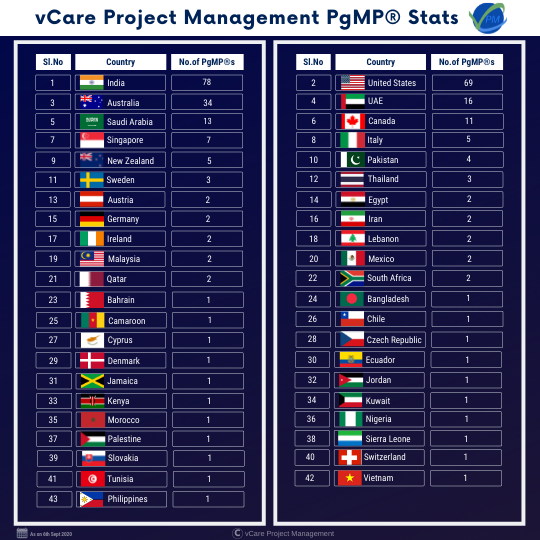
vCare Project Management PgMP® Stats
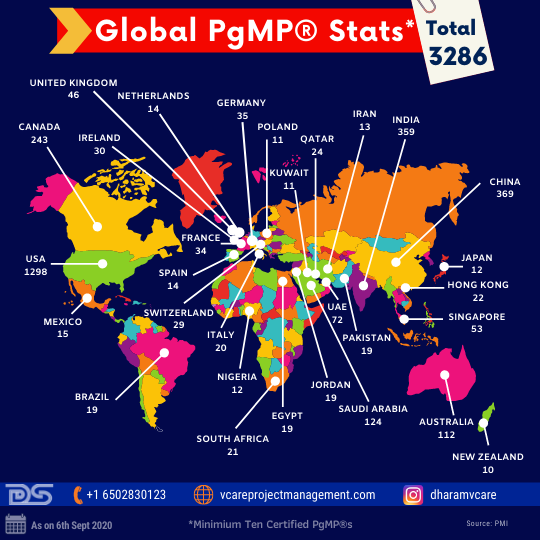
Global PgMP® Stats
Between 1st July 2020 and 1st Sept 2020, 27 professionals successfully attained their PfMP®, of which 2 are my students.
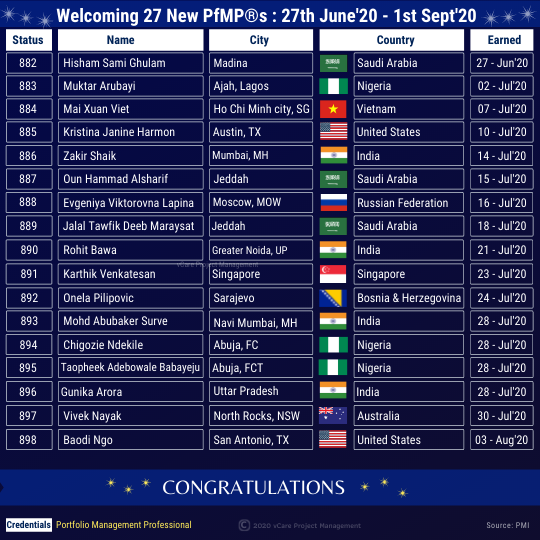
Welcoming 27 New PfMP®s
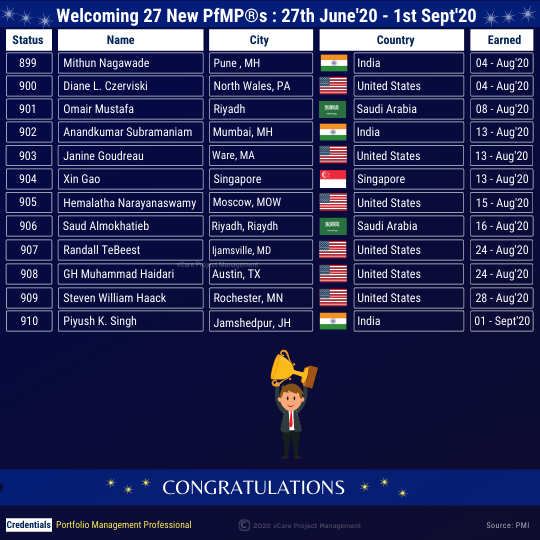
Welcoming 27 New PfMP®s
As on 1st Sept 2020, Global PfMP® count is 911, with 41 of them (5%) with a successful pass rate of 100% being aided by our services.
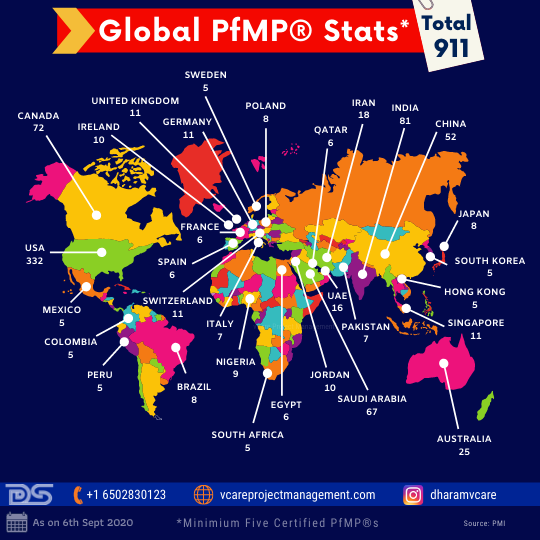
Global PfMP® Stats
Special thanks to the 14 students for entrusting me with their PgMP® / PfMP® certification journey.
1. Vikas Kumar 2. Gautam Bhatia 3. Jason Gardel 4. Faysal Ghauri
5. Tushar Rawal 6. Oleg Kazalov 7. Kalo Atanasov 8. Ranjit Oberai
9. Ambarish Gupta 10. Hemansh Rastogi 11. Vincy Li 12. Natalie Romanoff
13. Omair Mustafa 14. Hisham Sami Ghulam
Even as this pandemic crisis is still rolling out and impacting our economy and jobs, many professionals have elected to emerge out of their comfort zones and work towards pursuing their learning/certification goals. For us, as a leading training provider, the challenge was to customize and optimize our training delivery to meet the online learning requirements that time has thrust on us. What we saw as a challenge and a difficult mountain to climb initially, later turned out to be a smooth journey filled with more advantageous in terms of course delivery, benefiting both the trainers and students on many fronts. Whoever is taking advantage of this lean period to lunge forward are already starting to see benefits with their professional life.
My opinion is that 95% of people stay in their comfort zone. Around 3% people take steps to walk in the fear zone and stay there or come back to comfort zone. 1.5% people stay in the learning zone, and some of them come back to Fear Zone or even Comfort Zone. 0.49% people reach to the Growth Zone, some come back to the lower zones. Less than 0.01% of people go above or stretch beyond the Growth Zone and do wonders. They never return to the lower zone as they move with the escape velocity. Do come out of your comfort zone; the sky is your limit. For those already in the sky, space is your limit. Trust me; you will live a life beyond your dreams. Between, no one is born with skills and attitude, which will take you all the way. More you look inside it will assist you to look beyond the invisible boundaries.
For those of you in the project management space, who wish to get help in navigating out of your comfort zone and achieve PgMP® / PfMP® certifications, consider signing up for our online programs. We will guide you through all the facets of the PgMP® / PfMP® certification journey. Taking into consideration the hardships that companies and professionals are going through currently, we are offering multiple discounts and flexible payment options to these programs. These programs are conducted over customized timings across different time zones to cater to the requests of the students. Given below are the various online programs’ links. Kindly share this information with anyone who you believe might benefit from it.
PgMP®: http://bit.ly/2oBKQXQ
PfMP®: http://bit.ly/39jOZSf
PMP®: https://bit.ly/2BU0mFp
E-Learning: http://bit.ly/3b2HOid
For any questions related to Project Management career, training and certifications, you can book an obligation free 15 minutes session with me by visiting talktodharam.com
PgMP4U is an online mobile application that helps one prepare for the PgMP® exam on the go. Our app gives the essential support required for cracking the PgMP® exam.
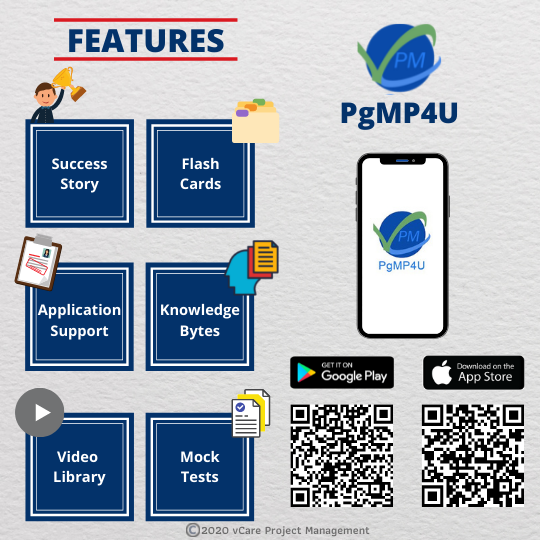
PgMP4U
PgMP4U LinkedIn Group: http://bit.ly/2SBPwIp
PfMP4U LinkedIn Group: http://bit.ly/31P7GKR
Subscribe to vCare Project Management YouTube Channel to view our PgMP® and PfMP® Success Stories: https://bit.ly/2YF0wJl
Subscribe and follow my Podcasts and interviews with Project Management Experts on YouTube at https://bit.ly/2NDY8wd
“Working together for success.”
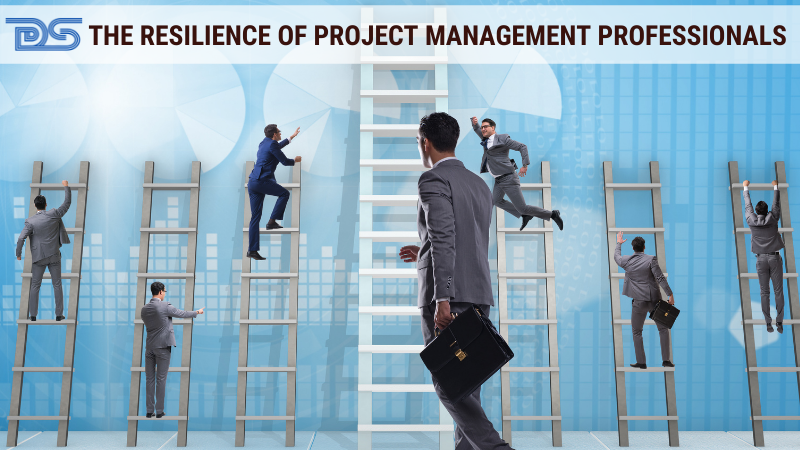
by DharamCW | Jun 26, 2020 | General
The impact of Covid-19
The key to surviving a global crisis is to display resilience by adapting to the ever-changing circumstances and giving up current practices in favour of those that are more tailor-made for the situation at hand. Given that Covid-19 has led to an unpredictable stagnation of growth, we are now faced with what is known in project management terms as the “unknown unknown”, which are risks that come from completely unexpected situations. We are witnessing this in the form of a disease outbreak that has upset all of our lives.

Resilience of Project Management Professionals
Entire business pyramid collapses have left organizations with the question of whether or not to change their entire mode of operations. Naturally, the answer is to adopt any means necessary to ensure that they continue to generate value for their beneficiaries. With a PgMP® certification, program managers can add value to their organizations and truly make a meaningful difference in this aspect. There will always be a demand for qualified professionals in the market. A PgMP® certification allows its holders to stand apart from their peers.
PMP® and PgMP® certification – What is the difference?
PMP®: It is purely knowledge-based and theoretical, relying on test-taking to quantify a candidate’s ability in recollecting facts and data. There are over a million holders of this certification globally.
PgMP®: It is competency-based, and it requires the candidate to become acquainted with theoretical concepts and demonstrate their applications in a practical setting, akin to the real world. The candidate is subjected to a peer review where he must explain the thought process that led to his decision. Such rigorous scrutiny has kept the bar high and has helped produce some of the most competent program managers that the world has ever seen. There are only around 3100 holders of this certification.
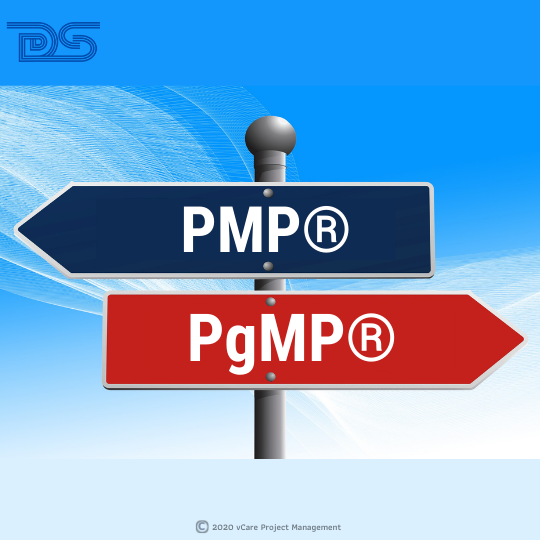
PMP® | PgMP®
In this environment of job insecurity and mass layoffs, such certifications are the most worthy qualifications that a professional can possess, to project his skill set and capabilities.
Value management: The generation of value is at the core of any organization. It may take on the form of project, program and portfolio management. Still, it is ultimately based on a single, underlying framework that binds them together, which is termed as “value management”. When program managers realize and embody this simple principle, an increase in revenue, market share and share value is bound to follow.
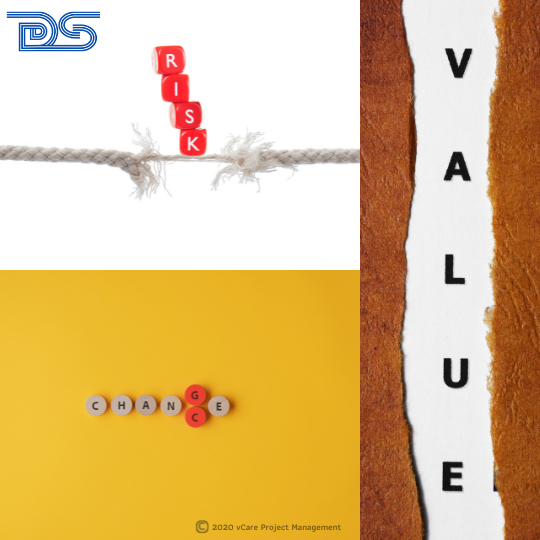
Value | Change | Risk
Change management is the ability of a manager to respond to disruptions, and it is the key to survival. But even when things change, some things will hold true at all times; one of which is the importance of the bond between organizations and their stakeholders. In times of adversity, program managers must display resilience and instil confidence in not just their organizations or their clients, but also their community at large.
Risk management: According to the PMI-PMBOK guidelines, risk is a subset of threats and opportunities. Where one sees a threat, another senses a chance, and by wreaking havoc on traditional establishments, the current economic climate has revealed gaps in the same that can be exploited by opportunistic individuals. The example that comes to the forefront is the health-care sector, and especially companies that manufacture masks, which have directly benefited from this disruption. However, this does not tarnish their reputation, as the global pandemic was neither orchestrated nor premeditated. Instead, they are merely providing an essential commodity that has gained tremendous value seemingly overnight. Hence, they are right to capitalize on this timely outcome.
So, while the path is clear for the health-care sector at the moment, it leaves professionals in other fields without clear guidance. Given the increased availability of free time, they ought to set their sights on an immediate short-term vision and leverage this half-year time frame to up-skill themselves, such as by acquiring PMI certifications, and the PgMP® in particular. This strategy would not only secure one’s immediate future but also pay dividends in the long term.
Staying ahead of the curve:
One of the ramifications of mass layoffs is the sudden arrival of experienced professionals in the job market pool, which inevitably fosters intense competition among job seekers. Driven by desperation, even veterans in the industry are willing to work for lower wages, which further snuffs out the ever-shrinking prospects of inexperienced, first-time jobseekers. As for those who have managed to keep their jobs, they still face the dilemma of maintaining relevancy within their organizations and justifying their pay. In both cases, an advanced certification such as the PgMP® will go a long way in proving one’s ability to create value, which is the hallmark of a competent manager. As stated by Michael Porter during the 2014 PMO conference, managers must always compete on value creation rather than a price reduction.

Staying ahead of the curve
Growth mindset vs predefined mindset
Growth mindset: A program manager who possesses this mindset is willing to adapt to changing situations by following the best course of action even it requires him to give up standard procedures.
Predefined mindset: A project manager who possesses this mindset sticks to the standard procedure regardless of the situation at hand.

Growth mindset vs predefined mindset
Despite the aura of despair in our current scenario, there is a case to be made for a bright future for those resilient managers who are willing to adopt a growth mindset and let go of a predefined one. And in terms of value proposition, an advanced certification can lay down the foundation for a sustainable future for one’s business as well as personal career growth.
In the below video, you can watch my interaction with Thomas Walenta and Olivier Lazar on the Resilience of Project Management Professionals amidst the COVID-19 crisis.
You can subscribe to my personal YouTube Channel using the link https://bit.ly/2NDY8wd. In this channel you can find videos of success stories, Q&A sessions and interactions with project-program-portfolio management experts. Subscribe to the channel and get notified on new videos.
For any questions related to Project Management training and certifications, you can book an obligation free 15 minutes session with me by visiting http://talktodharam.com/
View all our Online PgMP® Mentoring Programs
View all our Online PfMP® Mentoring Programs
PgMP4U LinkedIn Group: http://bit.ly/2SBPwIp
PfMP4U LinkedIn Group: http://bit.ly/31P7GKR
Email: [email protected]































Recent Comments